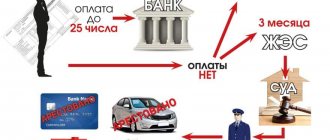Home / Housing disputes / The procedure for forced eviction from an apartment by court decision
Eviction from an apartment by court decision is an unpleasant and troublesome procedure. However, if a person does not want to move out of the home voluntarily, the owner has the right to go to court. Following the received decision, forced eviction from the apartment occurs by bailiffs. Officials act within the framework of the writ of execution, i.e. extracts from a court decision in a civil case.
How does eviction by court order by bailiffs work in 2021? Not only the owners, but also those who intend to move out of their living space should be aware of this. Knowing about all the intricacies of the procedure, you can avoid arbitrariness on the part of people in uniform, which, unfortunately, is by no means uncommon in our society.
✅ Grounds for eviction from an apartment
Before resorting to forced eviction from a residential premises, it is necessary to establish the reason for such an action. A social tenancy agreement cannot be terminated at the snap of a finger. Especially if the tenants comply with the rules of residence and have no debts to the management company and the landlord. We need compelling reasons and their consequences.
The grounds for eviction from housing by court decision are systematic and malicious violation of the rules of residence or loss of the right to use residential premises. An example would be the divorce of spouses, deprivation of parental rights, or the eviction of alcoholics for obvious disrespect for neighbors .
Here are the reasons that may result in eviction without the provision of other housing (Article 91 of the Housing Code of the Russian Federation):
- divorce of spouses and eviction of one of them from the apartment;
- the father or mother was deprived of parental rights in court;
- the debt to housing and communal services has exceeded 6 months;
- violation of the structure of a residential premises, mismanagement of someone else's property;
- systematic violations of the interests of neighbors (alcoholism, rowdy behavior, quarrels, smoking, drug addiction, noisy parties);
- operation of housing as a retail outlet, workshop, garage, warehouse, utility unit.
...as well as the grounds for when other housing will be provided (Article 85 of the Housing Code of the Russian Federation):
- eviction from residential premises due to alienation of the land plot under the house;
- the building is demolished as unsafe;
- transfer of living space to non-residential status.
Forced eviction from an apartment most often occurs for reasons from the first list, i.e. on the basis of Art. 91 Housing Code of the Russian Federation. True, the help of bailiffs may also be needed in case of eviction with the provision of other housing. For example, if people do not want to leave emergency housing, despite the authorities resettling them in a new comfortable residential building in a nearby area.
Letter of the law
Can the owner be evicted from the apartment? When raising the question of evicting the owner from an apartment, you need to know whether there is legislative regulation of this issue.
This formulation of the problem is quite acute, because the issues of eviction of unwanted tenants or former owners have received quite a lot of attention in modern current legislation.
This includes the Housing Code of the Russian Federation with its articles 86-89, and article 292 of the Civil Code.
However, the Constitution of the Russian Federation in paragraph 1 of Article 40 indicates that the right to housing is mandatory for anyone living on the territory of the state, and no one can be deprived of the place where he can live.
This raises the question: is it possible to evict the owner?
The answer to this question can be found in the Civil Code, which in paragraph 2 of Article 235 indicates that the owner can be deprived of his property only by a court decision and only if this body finds circumstances in the situation preceding the seizure of property that will help prove the use such property is not intended for its intended purpose.
As for housing and the eviction of the owner from it, the same Civil Code of the Russian Federation, but already in Part 1 of Article 293, states that such a procedure can be carried out only if the person who owns the living space uses the existing premises for other purposes than also, through its actions to exploit it, creates uncomfortable or life-threatening conditions for its neighbors .
Also, the eviction of the owner can be carried out if the owner allows the destruction of housing through its mismanagement.
You can find out in what cases they can evict without providing another living space, as well as whether they can evict you from a single apartment to nowhere, from our articles.
✅ What is forced eviction?
The term “forced eviction” refers to the expulsion of tenants, their belongings, pets, furniture and equipment from an apartment. Forced resettlement is carried out by special people - bailiffs.
The basis for eviction is a writ of execution + a resolution issued by the senior bailiff to initiate enforcement proceedings. Therefore, bailiffs do not have the right to evict people without the appropriate documents. Even if the tenant violates public order, he cannot be evicted until a court decision is made.
It is important to note that neither the prosecutor, nor law enforcement agencies, nor the district police officer have the authority to evict citizens without a court decision.
The actions of SSP employees are regulated by Federal Law No. 229 “On Enforcement Proceedings,” which provides a detailed procedure for the actions of bailiffs. Violation of the regulations can be appealed by the injured party within the period established by law.
Features of forced eviction from an apartment or house:
- If tenants are evicted for reasons beyond their control, the authorities are obliged to provide them with new, equivalent housing (Articles 85-89 of the Housing Code of the Russian Federation).
- New housing must comply with housing standards:
For example, in St. Petersburg and the region in 2021: single people – 33 sq. meters ; families of 2 or more people – 18 sq. meters per person , and for a dormitory - at least 9 square meters. meters per resident ).
- Eviction from a municipal apartment for debt obliges you to provide housing of a smaller area. The current debt remains (see “For what and in what cases can they be evicted from their only home?”)
- If the owner is evicted, the apartment is sold at auction: part of the funds will be used to pay off debts + enforcement fee; the other part goes to the owner to find and move into a new home.
- Along with the bailiffs officer, the owner and two witnesses (not interested), and in some cases employees of the Ministry of Emergency Situations (to open the lock and let the bailiffs into the apartment) must be present.
- If the debtor or his family members are not at home, this is not an obstacle to forced eviction by court decision.
The question arises, how does the actual eviction take place? Let's consider the procedure from the position of an official of the BSC.
✅ Is it possible to evict the owner of a residential premises?
The status of “apartment owner” gives the right not only to live in, but also to dispose of residential premises. The owner of the property has guaranteed protection of his rights:
- Private property is protected by the state (Article 8 of the Constitution of the Russian Federation).
- The law establishes that no one can lose property except by a court decision . In this case, the owner is entitled to mandatory compensation (Article 35 of the Constitution of the Russian Federation).
- You cannot evict a housing manager and members of his family if the apartment is their only place to live (Article 446 of the Code of Civil Procedure of the Russian Federation).
At the same time, the law does not say that it is impossible to evict the owner from the apartment. Therefore, eviction is possible, but only under compelling circumstances.
Options for eviction of the owner of a residential premises:
- voluntarily - if the owner of the apartment does not dispute this fact (for example, eviction during the sale of housing);
- compulsory order - used in the vast majority of cases (for example, if the owner violates public peace, but does not respond to notifications and comments);
- eviction with the provision of new housing - for example, if the land under the house is needed for the needs of the municipality;
- eviction with the provision of housing in a flexible fund - an example is the relocation of the family of a mortgage debtor (Article 106 of the Housing Code of the Russian Federation);
- eviction without the provision of housing - but with monetary compensation (for example, in the case of selling an apartment at auction).
Is it possible to be evicted without new housing and compensation? I have never encountered such cases in practice. Even if the owner has crossed all lines and is evicted through the court, he is paid compensation from the sale of his home. There is no second option with eviction to the street without compensation, including cases with mortgage debts.
✅ Procedure for eviction from an apartment by court decision
Bailiff offices are located in every locality. The executive decision on eviction is transferred to the nearest SSP at the defendant’s place of residence.
How the process works - the duties of the bailiff:
- Obtaining a writ of execution to evict a citizen from a residential premises.
- Studying documents, preparing for enforcement actions.
- The bailiff initiates enforcement proceedings based on a court decision.
- Notification of the applicant and the evicted person about the start of enforcement proceedings (according to Article 24 of Federal Law No. 229, notification is a mandatory condition).
- Providing a period for voluntary eviction.
- Visiting the apartment together with the authorities, the local police officer, the Ministry of Emergency Situations and witnesses.
- Forced eviction of the defendant:
- an act of eviction from the apartment is filled out (signed by 2 witnesses, the bailiff and the tenant);
- inventory of the property in the house (owner and debtor);
- sending the evicted person's belongings for storage;
- sealing the door or handing over the keys to the apartment owner.
- Issuance of a resolution on the completion of enforcement proceedings.
- Submission of the report to the judicial authority.
A mandatory condition in the actions of the bailiff is compliance with the law. It is prohibited to apply physical force to the defendant if the person does not show aggression and behaves adequately. Before evicting a tenant, the bailiff is obliged to introduce himself, show his identification and read to the evicted person his rights and obligations. Failure to comply with these rules serves as a reason to appeal the actions of people in uniform.
Who cannot be deprived of the right to live by a homeowner?
However, there is a category of inviolable persons whom the owner cannot evict under any circumstances, and if he does evict them illegally, they can get them to move back in through the court. The court may refuse an extract:
- If a citizen at one time refused to participate in privatization in favor of another person.
Such a citizen has an indefinite right to use privatized housing. However, since 2014, amendments have been made to this provision of the law: the refusenik must live in this apartment, participate in its maintenance, or obstacles must be imposed on him in living. If a person has not lived in this place for a long time and has another place of residence, he loses the rights to the living space in which he refused to participate in privatization. - When transferring an inheritance, a citizen living in an apartment under a will can continue to live in it even if the owner changes. The duration of residence is specified in the will, but most often it is for life.
- It is impossible to evict former members of the housing cooperative who contributed any part of the share for this living space and have a document confirming this. Such residents, as well as their spouses, have a lifelong right to the property they paid for, even if they are not the owners.
- In accordance with the terms of the marriage contract, if stipulated in it, the spouse cannot be evicted even if the family relationship is dissolved.
- After staying in an orphanage, minors retain the right to the remaining living space, so it will not be possible to discharge them from there.
These citizens have the unconditional right to live in residential space owned by another person and therefore cannot be evicted.
There are some other categories of citizens who, at the discretion of the court, may remain living in someone else’s property for any period of time:
- ex-spouses, if they do not have a place where they can move and do not have the funds to buy real estate (read about whether it is possible to evict from your only home);
- people who are dependent on the owner.
Attention: When purchasing residential real estate, you need to check it for the presence of registered citizens, so as not to continue to live with eternal neighbors next door.
As for minors, the law does not make concessions here and such situations are considered in the same way as with adults (read about the grounds on which minor children can be evicted here). Also, at any time, the court can restore the residence rights of people who were declared missing and then reappeared.
The same applies to former prisoners: if they were simply registered in this residential premises, and it was sold, then they will no longer be able to use your housing. But if a citizen who has served time or has ever been imprisoned has refused privatization in someone else’s favor, he has every right to push you out and the law will remain on his side.
More details about who and when it is impossible or difficult to discharge are described in the video:
✅ Deadline for eviction from the apartment by court decision
The law gives the defendant only 5 days to voluntarily vacate the residential premises from personal belongings, animals and household utensils (Article 107 of the Federal Law “On Enforcement Proceedings”). If, after the specified period, the person does not leave the apartment, the bailiff will set a new period, but with the obligation of the defendant to pay an enforcement fee - 7% of the value of the property.
The end of the second term triggers the process of forced eviction of the tenant(s). An official visits the apartment and expels the obstinate citizen with the help of law enforcement agencies (see “Eviction without provision of other living quarters?”)







